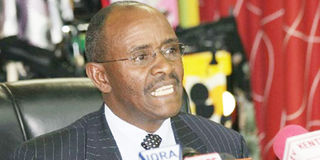Uchumi receivership in focus

Uchumi Supermarkets CEO, Mr Jonathan Ciano. Photo/FILE
Uchumi Supermarket’s receivership will be top on the agenda when the retail chain’s shareholders meet at the end of January.
According to details of the proposed Annual General Meeting, the lifting of receivership is planned for February 1, 2009, as the company shows strong signs of recovery from its cash-flow problems.
The fate of the one-time retail giant, put under receivership in June 2006 over a debt of Sh3 billion, lies with the Eastern and Southern Africa Trade and Development Bank (PTA Bank) and Kenya Commercial Bank, its two major creditors.
The January 29, 2010, meeting is also expected to pass a resolution to convert the government-backed revival plan, under which its some of loan and interests would be turned into equity.
It is also expected that the proposal to restructure part of the supermarket’s loan over a longer term would be given the nod.
A notice of the meeting signed by company secretary Wambui Maina also indicated that Uchumi directors would be mandated to engage the banks in restructuring the debenture loans.
Receiver managers led by Mr Jonathan Ciano have been able to turn around its business, posting a profit for the first time in many years last year.
Uchumi supermarket recorded a 60.4 per cent increase in profit before taxation for the year ending June 30, 2009.
Improving fortunes
It reported Sh170 million, up from Sh106 million it earned in the same period last year.
Profit after tax, however, jumped to Sh420 million, according to the company’s audited results.
During the year, the supermarket managed a 22.4 per cent increase in net sales from a previous Sh6.8 billion to Sh8.2 billion.
The supermarket also grew its balance sheet with total assets growing by 50 per cent from Sh1.6 billion in the last financial year to Sh2.4 billion.
When it was placed under receivership it had total asset base of Sh1.8 billion against a debt of Sh3 billion.
Over the last three years the retail chain has held three debentures, but raised only Sh207 million against a target of Sh1.2 billion, which would have helped it plug the financial deficit and get it not only out of receivership but also earn it relisting at the Nairobi Stock Exchange.
The success of the debenture was key to increasing the shareholders’ fund that run into negative, but most shareholders gave it a wide berth.
Its shares remain suspended since June, locking in value for thousands of shareholders.




